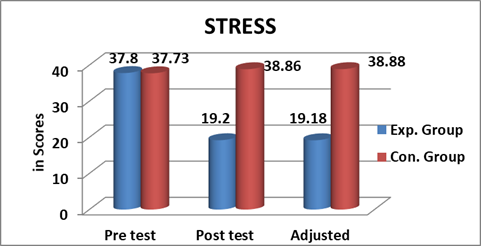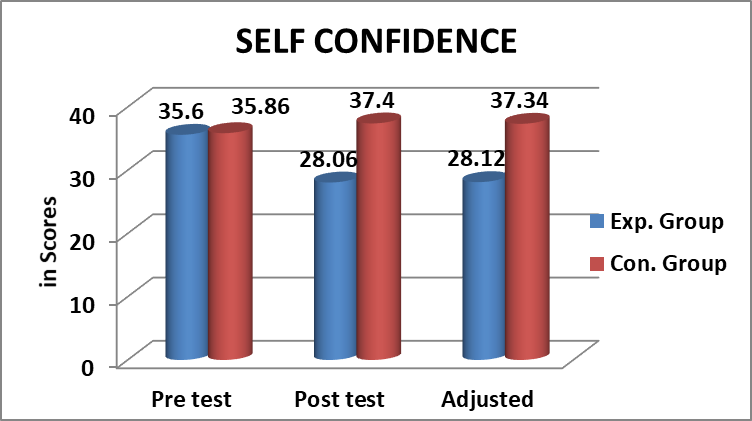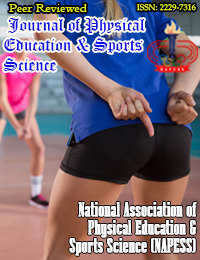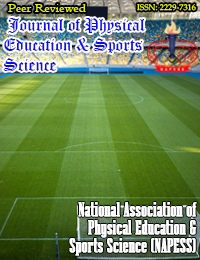EFFECT OF YOGIC PRACTICES WITH DIET MODIFICATIONS ON STRESS AND SELF CONFIDENCE AMONG OBESE COLLEGE GIRLS
Download PDF
The study was designed to find out the effect of Yogic Practices with Diet Modifications on Stress and Self Confidence among Obese College girls. It was hypothesized that there would be significant differences on selected psychological variables such as Stress and Self Confidence due to Yogic Practices with Diet Modifications among college obese girls than the control group. To achieve the purpose of the study, 30 college obese girls were selected randomly from Chennai between the age group of 18 to 21 years and were divided into two groups, such as experimental group and control group, each group consisting of 15 subjects. The Pre-test was taken for all subjects of the experimental group and control group on selected dependent variable before the training program. Stress and Self Confidence were measured by using the psychological question test. The experimental group practiced Yogic Practices with Diet Modifications for twelve weeks and the control group received no training. After the experimental period of twelve weeks, the post-test was done on selected dependent variables. The obtained data was statistically analysed using Analysis of Covariance (ANCOVA) to find out the significant difference between the experimental group & control group. The test of significance was fixed at 0.05 level of confidence. It was concluded that the Stress and Self Confidence (improvement) significantly decreased due to the Yogic Practices with Diet Modifications than the control group among Obese College girls. Hence the hypothesis was accepted at 0.05 level of confidence.
EFFECT OF YOGIC PRACTICES WITH DIET MODIFICATIONS ON STRESS AND SELF CONFIDENCE AMONG OBESE COLLEGE GIRLS
Dr. A.S. SELVAM, Assistant Professor, Yoga & Well Being, Saveetha School of Law, Saveetha University (Deemed to be University). Tamil Nadu, India-77, yogamozhiselvam@gmail.com
&
Dr.R. ELANGOVAN, Professor & Head, Faculty of Yoga Sciences, Meenakshi Academy of Higher Education and Research (Deemed to be University), Chennai -78, Tamil Nadu, India. relangovantnpesu@yahoo.co.in
ABSTRACT
The study was designed to find out the effect of Yogic Practices with Diet Modifications on Stress and Self Confidence among Obese College girls. It was hypothesized that there would be significant differences on selected psychological variables such as Stress and Self Confidence due to Yogic Practices with Diet Modifications among college obese girls than the control group. To achieve the purpose of the study, 30 college obese girls were selected randomly from Chennai between the age group of 18 to 21 years and were divided into two groups, such as experimental group and control group, each group consisting of 15 subjects. The Pre-test was taken for all subjects of the experimental group and control group on selected dependent variable before the training program. Stress and Self Confidence were measured by using the psychological question test. The experimental group practiced Yogic Practices with Diet Modifications for twelve weeks and the control group received no training. After the experimental period of twelve weeks, the post-test was done on selected dependent variables. The obtained data was statistically analysed using Analysis of Covariance (ANCOVA) to find out the significant difference between the experimental group & control group. The test of significance was fixed at 0.05 level of confidence. It was concluded that the Stress and Self Confidence (improvement) significantly decreased due to the Yogic Practices with Diet Modifications than the control group among Obese College girls. Hence the hypothesis was accepted at 0.05 level of confidence.
KEYWORDS: Yogic Practices, Diet Modifications, obesity, Stress and Self Confidence.
INTRODUCTION
Obesity is accumulated excess of adipose tissue in human beings and resulted as one of the public health problems in the world (Galuska, et. al., 1996). It was develops if there is a difference between more calories intake and expenditure and relation to health hazards in middle aged people. The number of people who are obese is raising rapidly worldwide marking obesity one of the fastest development public health problem (Pooja Malhaotea 2007).
The US topped the list with 13 per cent of the obese people worldwide in 2013, while China and India together accounted for 15 per cent of the world's obese population, with 46 million and 30 million obese people, respectively. According to the study, number of overweight and obese people globally increased from 857 million in 1980 to 2.1 billion in 2013. This is one-third of the world's population. In India, 23.9 crore people are obese. Obesity is the single most preventable health problem in India. Around 25% of people in Tamil Nadu are obese. 20.9% women are obese. Under and over activity in the genes like BDNF, intone 8 and PGCIa are the prime causes for obesity. Imbalances of the hormones such as Ghrelin and Dopamine in the brain and Leptin in the stomach are the other causes. Yogic practices and Diet Modifications on all aspects of obesity or excess weight physical, emotional and body Regular practice of yoga with Diet Modifications and controlled life style reduces obesity (weight is reduced). Yoga and Diet Modifications make human being agile, efficient and slim. The researcher of this study, therefore, intends to see the effect of yogic practices and Diet Modifications in controlling obesity among Obese College girls.
Statement of the problem
The purpose of the study was to find out the effect of Yogic Practices with Diet Modifications on Stress and Self Confidence among Obese College girls.
HYPOTHESIS
It was hypothesized that there would be significant differences due to Yogic Practices with Diet Modifications than the control group on Stress and Self Confidence among Obese College girls.
REVIEW OF RELATED LITERATURE
Bernstein, A. M., et.al., (2014). conducted a study on Yoga in the management of overweight and obesity. A search of multiple databases through September 2012 was undertaken identifying peer-reviewed studies on yoga, meditation, mindfulness, obesity, and overweight. Studies on yoga and weight loss are challenged by small sample sizes, short durations, and lack of control groups. In addition, there is little consistency in terms of duration of formal group yoga practice sessions, duration of informal practices at home, and frequency of both. Studies do however suggest that yoga may be associated with weight loss or maintenance. Mechanisms by which yoga may assist with weight loss or maintenance included energy expenditure during yoga sessions, allowing for additional exercise outside yoga sessions by reducing back and joint pain, heightening mindfulness, improving mood, and reducing stress, which may help reduce food intake; and allowing individuals to feel more connected to their bodies, leading to enhanced awareness of satiety and the discomfort of overeating. It was concluded that the yoga appears promising as a way to assist with behavioral change, weight loss and maintenance.
Tundwala V Gupta (2012) conducted a study on the study on effect of yoga and various asanas on obesity, hypertension and dyslipidemia. This study was 150 patients after screening inclusion and exclusion criteria for obesity, hypertension and dyslipidemia. The duration of the study was 3 months. Various parameters on demographic and clinical data for these diseases were recorded at the start of the study.75 study group Patients were to attend Yoga camp daily for 3 months. The clinical data was again recorded at the end of the study period of 3 months for comparison. The effect of Pranayama and certain yogic asanas on parameters of obesity viz. weight reduction (BMI and waist hip ratio), Blood pressure and lipid profile were studied. To analyses the data t test was used. The test of significance was fixed as 0.05 level of confidence. It was concluded that was significant decrease in the parameters of obesity viz. BMI and WHR, significant improvement in hypertension both systolic and diastolic blood pressure and significant improvement in various lipid profile parameters viz. decrease in total cholesterol, stress, triglycerides, stress and increase in self confidence in study group as compared to control group.
METHODOLOGY
For the purpose of this random group experimental study, thirty (30) Obese College girls in Chennai were selected at random as subjects based on their Stress and Self Confidence and their age was ranged from 18-21 years. Yogic Practices with Diet Modifications were given five days (Monday to Friday) per week for twelve weeks. All the subjects were randomly assigned to experimental group and control group each consisted of 15 subjects. Experimental group was involved in Yogic Practices with Diet Modifications for twelve weeks, and the control group kept in active rest. The Yogic Practices with Diet Modifications includes Preyar, Loosing Exercise, Suryanamaskar, Tadasana, Trikonasana, Ardhakatichakrasana, Paschimottasana, Ustrasana, Ardhamatsyendrasana, Bhujangasana, Salabasana, Dhanurasana, Navasana, Sarvangasana, Savasana, Surya Bhedhana, Nadi shudhi, Kapalabati, Japa Meditation and Relaxation, and Morning break past; Sprouts idly, chattni, Sambar, banana or guava, Snacks; vegetable soup /Herbal juice, Lunch; Rice, Green leafy vegetables, vegetables, fruits & butter milk, Snacks; Nuts, fruits like pine apple, Dinner; chapatti & dal with vegetables, fruit salad and milk Techniques. Initially pre-test was taken and after the experimental period of twelve weeks, post-test was taken from all the two groups. The differences between initial and final Stress and Self Confidence variables were considered as the effect of Yogic Practices with Diet Modifications on selected subjects. Analysis of Covariance (ANCOVA) test was used to find out the difference among the experimental group and control groups. The test of significance was fixed as 0.05 level of confidence.
RESULTS AND DISCUSSION
The data pertaining to the variables collected from the two groups before and after the training period were statistically analyzed by using Analysis of Covariance (ANCOVA) to determine the significant difference and tested at 0.05 level of significance.
RESULTS ON STRESS
The Analysis of Covariance (ANCOVA) on Stress Yogic Practices with Diet Modifications and control group was analyzed and are presented in table-I
Table-I
COMPUTATION OF ANALYSIS OF COVARIANCE OF TRAINING GROUPS AND CONTROL GROUP ON STRESS (in Scores)
|
Test |
EXP GROUP |
CON GROUP |
SV |
SS |
Df |
MS |
F |
|
Pre test Mean |
37.8
|
37.73
|
Between |
0.03 |
1 |
0.03 |
0.00 |
|
Within |
241.33 |
28 |
8.61 |
||||
|
Post test Mean |
19.2
|
38.86
|
Between |
2900.83 |
1 |
1450.41 |
102.00* |
|
Within |
398.13 |
28 |
14.21 |
||||
|
Adjusted test Mean |
19.18
|
38.88
|
Between |
2909.89 |
1 |
1454.94 |
114.75* |
|
Within |
342.31 |
27 |
12.67 |
||||
|
mean difference |
18.6 |
1.13 |
*Significant at 0.05 level of confidence (Table F-ratio at 0.05 level of confidence for 2 and 28 (df) =4.20, 1 and 27 (df) =4.21).
The obtained F-ratio value for the Stress were greater than the table value, it indicates that there was a significant difference among post test and adjusted post-test means of the Yogic Practices with Diet Modifications group than the control group. The pre-test, post-test and adjusted post-test mean values of Yogic Practices with Diet Modifications and the control group on Stress were graphically presented in Figure 1.
Figure 1
Bar diagram showing the mean difference of Yogic Practices with Diet Modifications group, and control group on Stress (in Scores)

RESULTS ON SELF CONFIDENCE
The Analysis of Covariance (ANCOVA) on Self Confidence Yogic Practices with Diet Modifications and control group was analyzed and are presented in table-II
Table- II
COMPUTATION OF ANALYSIS OF COVARIANCE OF TRAINING GROUPS AND CONTROL GROUP ON SELF CONFIDENCE (in Scores)
|
Test |
EXP GROUP |
CON GROUP |
SV |
SS |
Df |
MS |
F |
|
Pre test Mean |
35.6
|
35.86
|
Between |
0.53 |
1 |
0.53 |
0.19
|
|
Within |
77.33 |
28 |
2.76 |
||||
|
Post test Mean |
28.06
|
37.4
|
Between |
653.33 |
1 |
326.66 |
84.27*
|
|
Within |
108.53 |
28 |
3.87 |
||||
|
Adjusted test Mean |
28.12
|
37.34
|
Between |
633.03 |
1 |
316.51 |
90.64* |
|
Within |
94.28 |
27 |
3.49 |
||||
|
mean difference |
7.53 |
1.53 |
*Significant at 0.05 level of confidence (Table F-ratio at 0.05 level of confidence for 2 and 28 (df) =4.20, 1 and 27 (df) =4.21).
The obtained F-ratio value for the Self Confidence were greater than the table value, it indicates that there was a significant difference among post test and adjusted post-test means of the Yogic Practices with Diet Modifications group than the control group. The pre-test, post-test and adjusted post-test mean values of Yogic Practices with Diet Modifications and the control group on Self Confidence were graphically presented in Figure 2.
Figure 2
Bar diagram showing the mean difference of Yogic Practices with Diet Modifications group and control group on Self Confidence (in Scores)

CONCULSIONS
It was concluded that Yogic Practices with Diet Modifications on Stress (decreased) and Self Confidence (increased) than the Control group among Obese College girls.
REFERENCE
Pooja Malhaotea (2007), Calories, New Delhi, Strerling Publication Pvt. Ltd: Pp16-25.
Galuska, D. A., Serdula, M., Pamuk, E., Siegel, P. Z., and Byesr, T. (1996). “Trends in Overweight Among US Adults from 1987 to 1993: A Multistate Telephone Survey.” American Journal of Public Health, 42(1), Pp. 86
Bernstein, A. M., Bar, J., Ehrman, J. P., Golubic, M., & Roizen, M. F. (2014). Yoga in the management of overweight and obesity. American Journal of Lifestyle Medicine, 8(1), Pp. 33-41.
Tundwala, V, Gupta R. P., Kumar S., Singh, V. B Sandeep et.al., (2012). “A study on effect of yoga and various asanas on obesity, hypertension and dyslipidemia”, Internal Journal of Basic Applied Medical Science, 2(1): Pp.93-98.
WEBSITES
www.who.com
www.yoga point .com
www. ncbi.org.in

















